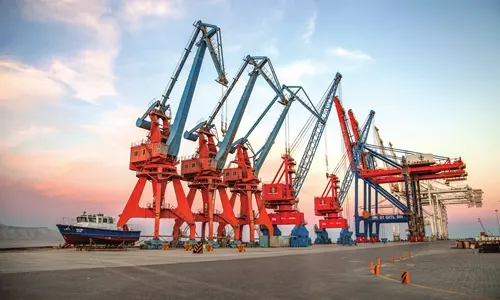HISTORY shows that alliances enable states to prosper greatly. Global power dynamics shift when states unite to showcase their economic and strategic strength. The China-Pakistan Economic Corridor (CPEC) is an extremely ambitious project of great significance. This corridor aims to strengthen the relationship between Pakistan and China, promoting collaboration in social, cultural and economic domains. The extensive network of railways, highways and pipelines known as CPEC connects Gwadar Port in Pakistan to China’s Xinjiang region. China benefits from CPEC, while Pakistan has the chance to transform Baluchistan and improve the country’s socio-economic indicators.
CPEC has been hailed as a game changer for Pakistan’s economy, although there are concerns about it becoming a debt trap. Despite the concerns stemming from Pakistan’s poor economic situation, CPEC offers a bright opportunity. CPEC is a significant milestone in Pakistan’s economic revitalization. Pakistan urgently requires improvements in its energy sector. Furthermore, there is a great need for substantial investment in Balochistan’s infrastructure. The purpose of CPEC’s energy projects is to alleviate Pakistan’s long-standing energy shortages and stimulate industrial and economic growth.
Furthermore, Pakistan must improve its export base. The development of CPEC will result in unparalleled infrastructure growth, job creation and industrial expansion. CPEC is predicted to boost trade efficiency by improving connectivity and reducing transportation expenses, making Pakistani exports more competitive globally. Furthermore, the project can improve regional integration and cooperation. Connecting Pakistan with China and other Central Asian countries, CPEC can make Pakistan a key trade hub in the region. The enhanced connectivity is considered a driving force for socio-economic progress, particularly in less developed regions such as Balochistan. The CPEC initiatives have the potential to improve infrastructure and job prospects for the locals.
On the flip side, some circles have raised concerns about the dangers of getting trapped in a cycle of debt. Pakistan’s debt burden could worsen due to the loans and investment linked to CPEC. There is a fear that if Pakistan does not make enough money from CPEC projects to repay the debt, it may have to give up strategic assets to China, as Sri Lanka did with the Hambantota Port.
Critics highlight the absence of transparency and the potential for corruption in CPEC agreements as worrisome. Proper oversight and accountability are being demanded by critics to maximize the benefits of CPEC for all. A few segments fear that unequal distribution of CPEC benefits may result in social and political tensions among provinces. Moreover, concerns have arisen among local communities regarding the environmental effects of extensive infrastructure initiatives, potentially affecting local communities in the long run. The CPEC project is a transformative force that should be pursued with unwavering optimism and full force. CPEC is a beacon of hope for Pakistan and a path forward for addressing the country’s long-standing economic and infrastructural challenges. Robust monitoring and evaluation mechanisms are necessary to prevent debt crisis risks in CPEC projects.
Furthermore, transparency is viewed as vital not only for deterring corruption but also for fostering public trust and gaining backing for CPEC. To maximize the impact of CPEC, it is crucial to involve provincial governments and local communities in decision-making, ensuring a balanced distribution of its benefits. To reduce harm to local ecosystems and populations, the government needs to implement comprehensive environmental and social impact assessments.
Developing a comprehensive CPEC trade and economic policy is crucial for Pakistan, with a focus on making the corridor a key driver of export growth. Activating idle infrastructure and energy plants is crucial for Pakistan to avoid getting trapped in China’s debt cycle. Pakistan can utilize CPEC to achieve sustainable economic growth by transitioning from a security-oriented state to a developmental state. The successful implementation of CPEC projects relies on achieving political consensus, especially in regions like Balochistan. The underdeveloped region of Balochistan stands to gain significant benefits from CPEC. Pakistan can promote stability and inclusivity by addressing the socio-economic issues of the Baloch people and improving their living conditions through CPEC projects.
The establishment of a national task force is crucial for examining the CPEC debt liability and servicing. The task force must analyze the financial effects of CPEC projects, negotiate advantageous terms with China, and create debt management strategies. By taking this approach, Pakistan can prevent excessive debt and guarantee the long-term viability of CPEC. The study of China’s culture and governance models via CPEC can offer valuable insights to Pakistan. Pakistan can improve its governance and economic policies by studying China’s development experiences and implementing relevant practices. Cultural exchanges have the potential to enhance bilateral relations and promote mutual understanding between both countries.
To achieve sustainable development, Pakistan should adopt a comprehensive trade and economic policy, build political consensus and ensure effective oversight of CPEC. CPEC offers a wealth of opportunities for Pakistan. Nevertheless, some obstacles must be dealt with to expedite the progress of CPEC. Pakistan is in serious need of projects like this to boost regional connectivity and offer opportunities to its population. It’s crucial to make wise decisions now to ensure that this project reaches its highest level of progress and that the two countries can truly accomplish what is expected from CPEC. Pakistan sees CPEC as a vital source of support, like an oxygen cylinder, to help overcome the current economic, political, and social difficulties. We need to take every necessary action to ensure the success of CPEC. This is a crucial opportunity for the country’s prosperity, and we can’t afford to lose it.
—The writer is an educationist and a Commoner from 44th Common.










